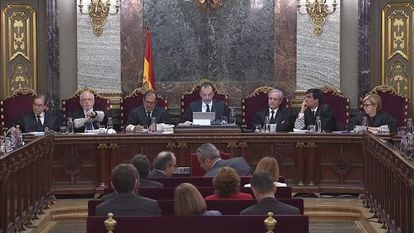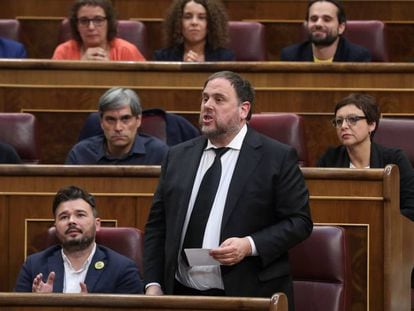Defense at Catalan separatist trial admits there was disobedience
In closing arguments, lawyers for independence leaders accepted the lesser charge but denied accusations of rebellion, sedition and misuse of public funds

Yes, there was disobedience, but no, there was no rebellion against the Spanish state. Defense lawyers for the 12 Catalan separatist leaders currently on trial at the Supreme Court have been delivering their closing arguments after nearly four months of hearings, claiming that their clients are innocent of charges that could entail prison terms of up to 25 years.
The lawyers for former deputy Catalan premier Oriol Junqueras and other political and civil separatist leaders denied the accusations of rebellion, sedition and misuse of public funds in connection with the failed secession bid of October 2017.
Instead they admitted to disobedience, an offense that entails being banned from public office but carries no prison sentence.
“The concept of disobedience is being confused with rebellion,” said Andreu Van den Eynde, the lawyer for Junqueras and Raül Romeva, the former Catalan chief of foreign affairs.
The lawyers held that rebellion entails the kind of violence that can bring a state to its knees, and that this did not happen – the proof being that the central government in Madrid did not decree a state of siege.

Van den Eynde insisted that the investigation against secessionist leaders is “a general cause against a political movement in favor of independence,” and argued that prosecutors have not a single shred of evidence tying his clients to the acts of violence that took place in front of the regional economy department building during a police raid to seize referendum material in September 2017.
Van den Eynde admitted that his clients repeatedly disobeyed decisions by the Constitutional Court, which had warned that holding a unilateral independence referendum would violate the highest law in Spain.
A vote without legal guarantees was nevertheless held on October 1, 2017 amid clashes with the Spanish police, and an independence declaration read out a few days later inside the Catalan parliament, which was controlled by separatist parties.
Not real secession
Javier Melero, who is defending former interior chief Joaquim Forn, on Tuesday admitted that his client also committed disobedience. But he went further, suggesting that the entire independence drive was never aimed at true secession, and that not even the Catalan government really believed in the declaration.
“The Govern never made a formal independence declaration, and the next day it did everything possible to relinquish power without resistance. No flags were lowered, nothing was communicated to the diplomatic corps,” said Melero. “I am aware that some may be bothered by this version of events. But that’s what happened.”
The concept of disobedience is being confused with rebellion
Defense lawyer Andreu Van den Eynde
Underlying this claim is the fact that Carles Puigdemont, the head of the Catalan government at the time, said on October 10 that the results of the referendum gave him a mandate to turn Catalonia into an independent state, yet immediately added that the effects of the independence declaration should be suspended so dialogue could begin with Madrid. The ambiguous phrasing led to questions of whether independence had in fact been declared or not. On October 27, the declaration was put to a controversial vote inside the regional parliament, where the opposition walked out in protest.
The central government then triggered a constitutional tool – Article 155 – that suspended Catalonia’s powers of self-government until fresh regional elections were held and a new Catalan premier appointed in May 2018. Puigdemont and several aides fled Spain to avoid being arrested and tried like his cabinet members who stayed behind.
The trial is expected to conclude this week, with a verdict not likely until the fall.
English version by Susana Urra.












































